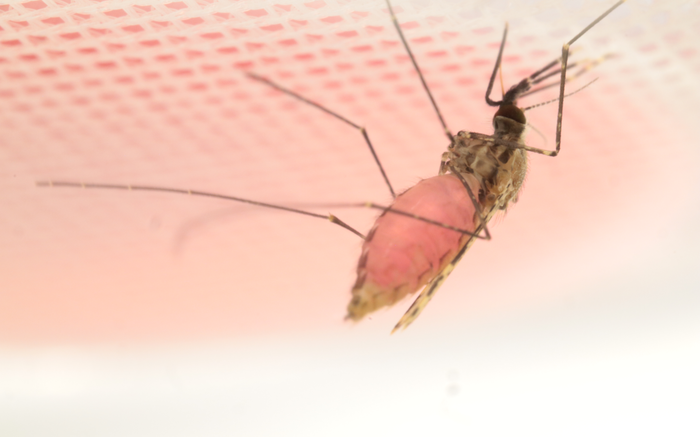The female Anopheles mosquito drinks a pink cocktail containing beetroot juice and HMBPP. Image captured in Emami Lab by Melika Hajkazemian.
Mosquitoes can and do feed on HMBPP-supplemented beetroot juice. This is the findings of a study at Stockholm University. HMBPP is a metabolite which is produced by the Malaria parasite, Plasmodium. The researchers have shown that it is possible to mimic a blood meal so closely that mosquitoes naturally prefer this artificial solution by using HMBPP supplementation as well as an addition of a protein/lipid mixture to any plant juice, particularly beetroot juice.
Mosquitoes can be tricked into feeding on the beetroot-based mix with an addition of toxins. The researchers tested four different types of toxins, containing capsaicin, savory oil, boric acid and fipronil sulfone (insecticide) and compared them to a control meal. The tendency to land and ingest the insecticide cocktail was on a level that matched the non-toxic meal, which in turn caused all the tested mosquitos to die within 100-350 minutes post feeding.
“This mixture, that we call pink juice, is a harmless, inert, eco-friendly solution, but it is naturally toxic for female mosquitos when ingested by them, says Noushin Emami, associate professor in the Department of Molecular Biosciences at Stockholm University.
“Altogether, we here provide a proof-of-concept for a specialized and eco-friendly feeding trap that can be deployed where needed. We hope to see it tested in a field setting and in combination with other vector control approaches," says Emami.
Emami’s group researches mosquito blood meal uptake and specific attractants and stimulants. The phagostimulant HMBPP is taking aim at eliminating mosquito borne diseases by modifying mosquito behaviors and thus allowing to specifically control their populations. Being able to target only blood seeking species of mosquitoes and at the same time not affecting other organisms is paramount in today’s age of declining global biodiversity, pesticide health hazards and emerging pesticide resistance.
“There are a number of new, exciting, high tech approaches targeting mosquitoes which are entering a large-scale testing but I believe that there is a lot of potential in developing very simple, but highly effective solutions based on simple molecules and using materials which are not only affordable but also accessible to almost anyone. We used beetroot in this study to demonstrate exactly this point," says Emami.
Source: Stockholm University
